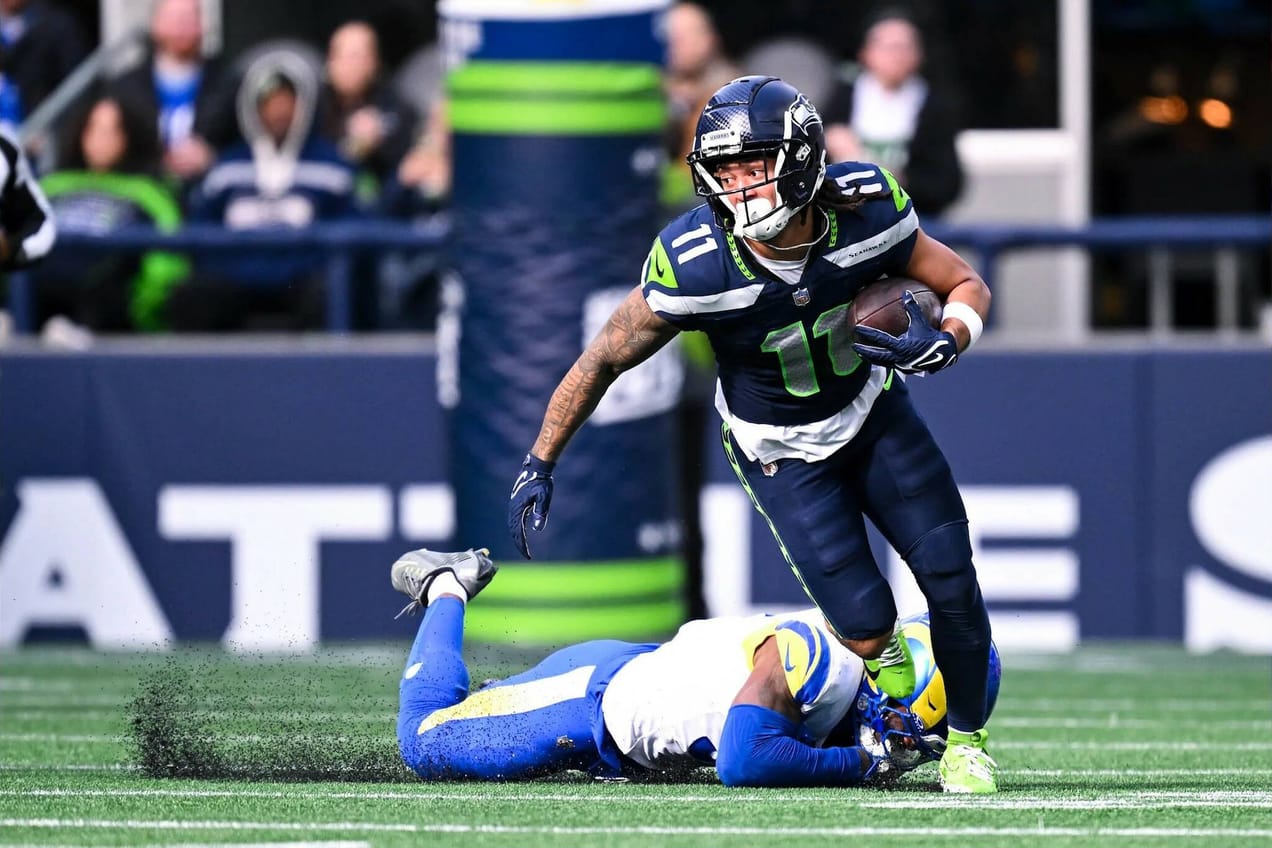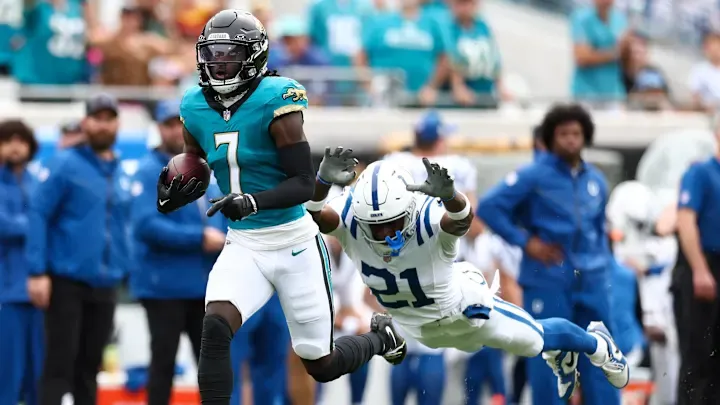
Thinking Critically About Off-Season Narratives
The NFL offseason spits out narratives like a saw blade churning through wood—our takes as permanent as kerf. Our unconscious minds reinforce our biases on repeat; it’s an involuntary reflex. And when others confirm our biases, those become as impenetrable as city walls.
And yet, parroting the most deeply held narratives during the offseason can easily be, in retrospect, an obvious blunder.
Every year, I try to focus on what narratives I feel are being repetitiously promoted by the echo chamber and think critically about whether they pass muster. I’m going to take you through my process on three stories of the off-season, but there are dozens more. In general, fantasy GMS should turn on pop-up blockers, learning to send every narrative – even the most universally held – through a filter of critical thought, ensuring we aren’t wearing blinders.
To serve as an example, these are the narratives I’m most obsessed with right now.
False Premise
False Premise
noun | \ ˈfȯls ˈprɛ-mɪs \
Definition:
An incorrect proposition or assumption that forms the basis of an argument or line of reasoning; a premise that is untrue and, when accepted as true, typically leads to invalid or unsound conclusions.
Etymology:
From false (Middle English, from Old French fals, from Latin falsus meaning "deceptive, unreal") + premise (late Middle English: from Old French premisse, from Medieval Latin praemissa, feminine past participle of praemittere "to send before," from Latin prae- "before" + mittere "to send").
Pronunciation:
· American English: /ˈfɔːls ˈprɛmɪs/
Usage Note:
A false premise undermines the entire argument or conclusion that depends on it. It is often used in logical discussions to identify faulty reasoning.
FALSE PREMISE NO. 116 – WHAT HAPPENS IF THE CLEVELAND BROWNS AREN’T THAT BAD?
Look, I’m not here to predict the Browns are playoff-bound, or even necessarily advise on their league-worst 4.5 Vegas win total. But why are we so certain they’ll be awful, and what happens if that premise is wrong?
Yes, they were a mess last year. But in 2023, the Browns made the playoffs and were on a heater down the stretch, led by the same Joe Flacco who was named their starter last week.
Then there’s Kevin Stefanski. Since the NFL introduced the Coach of the Year award, only 13 men have won multiple times. Stefanski is one, joined by legends like Don Shula, Bill Belichick, Bill Parcells, Joe Gibbs, and George Halas. He’s a direct disciple of Gary Kubiak, one of the progenitors of the modern “Shanahan” system, has a track record of creating leverage mismatches, and was once praised by PFF as one of the league’s best play-callers.
His record isn’t pristine, but context matters, and Stefanski has faced a significant amount of adversity. He installed his entire offense remotely during the pandemic. He’s had seven different starting QBs in five years. He lost Nick Chubb almost immediately in 2023. And he’s been saddled with the Deshaun Watson contract, maybe the most toxic anchor in NFL history.
The Cleveland defense was middle-of-the-pack last season:
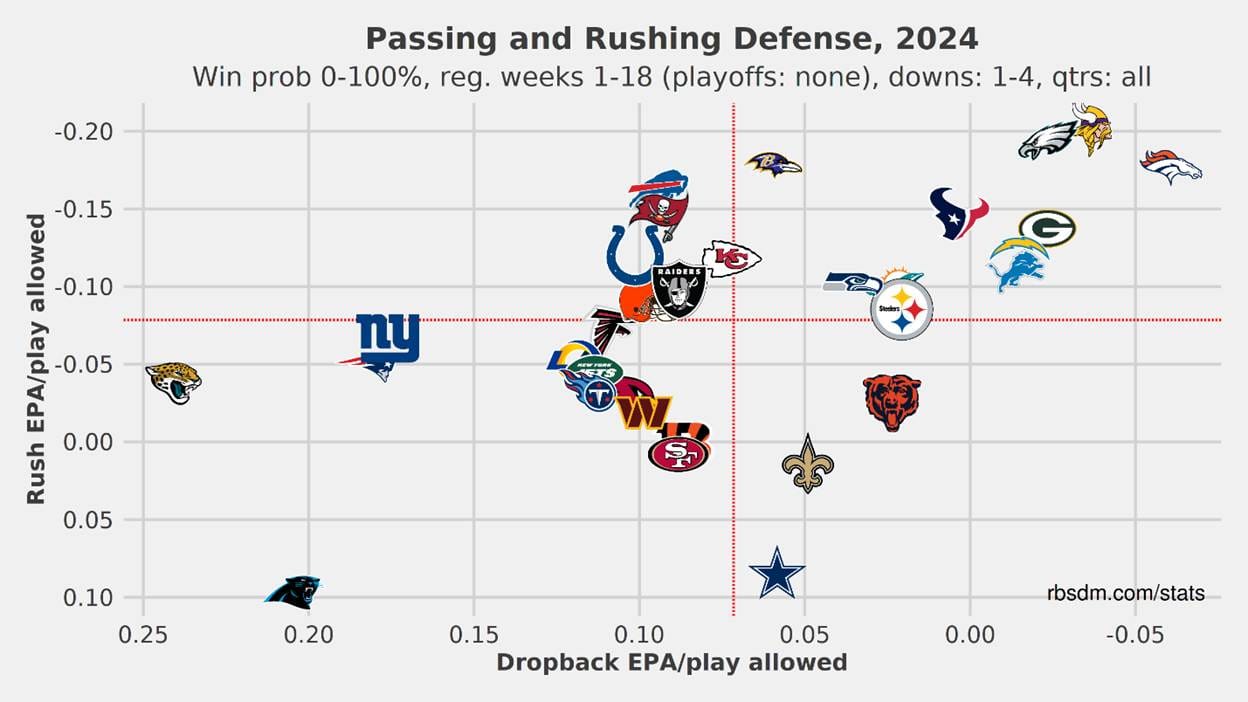
But they were far and away the best in the league in 2023 with a -0.155 EPA/play:
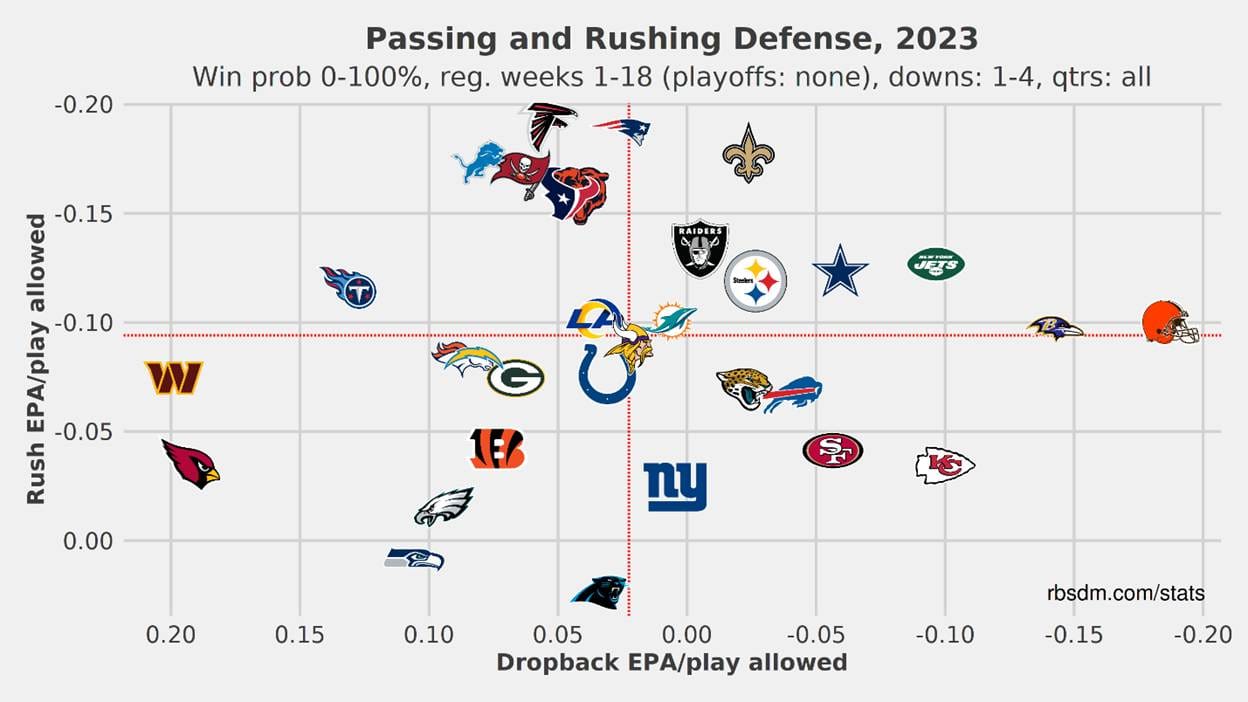
They Browns struggled with tackling in 2024, integrated young defenders in the secondary, and faced starting QBs 94% of the time – the league’s highest rate, well above the 76% NFL average – while playing in one of the NFL’s hardest divisions. Injuries and a poor turnover rate also had a major impact in 2024, each with a potential for favorable regression to the mean. They are a bounce-back candidate.
Offensively, Cleveland rotated through Deshaun Watson, Dorian Thompson-Robinson, Jameis Winston, and Bailey Zappe in 2024, dropping from first in time of possession in 2023 to 16th. The defense saw more snaps than in 2023, when they faced the second-fewest plays in the league.
Their offensive line is questionable, though Stefanski’s system tends to mitigate pressure better than most, even if Flacco hasn’t excelled under the heat. They begin the season without second-round pick Quinshon Judkins, potentially on track for a lost year. Jerome Ford has been highly efficient, and fourth-rounder Dylan Sampson was already sparsely used this preseason (more on that in a moment). One potential indicator that Judkins' situation could drag on is a report that surfaced this past weekend that the Browns were calling teams about RB help.
The Browns’ pass-catcher stable isn’t awful: Jerry Jeudy posted a legitimate fifth-year breakout (he is one of two receivers who have dinged as a significant hit in my Overlooked Stats series this summer), Cedric Tillman and David Njoku flashed, and rookie Harold Fannin drew rave reviews in camp before he was also played sparingly in the preseason (more on that in a moment, too).
If the Browns are more competitive than anticipated, Flacco could remain the starter longer than expected – potentially until playoff elimination becomes inevitable. Putting ourselves in the shoes of Stefanski and GM Andrew Barry, no strangers to criticism, I don’t know why they wouldn’t feel like their best chance at vindication from Watson and a horrendous season would be a playoff run that proves everybody wrong.
I know there have been numerous reports that the Browns will cycle through all of their QBs throughout the year, but why would they name Flacco the starter for Game 1 unless they wished to begin from a premise of competitiveness? And if that is so, then, why wouldn't they stick with that premise for as long as it is working? If the Browns are pacing for seven or eight wins, it is easy to imagine Stefanski and Barry sticking with him and trying to make a run. That scenario bodes well for every fantasy-relevant player, particularly Jeudy and Njoku, as Flacco’s presence could mean more offensive plays and TDs.
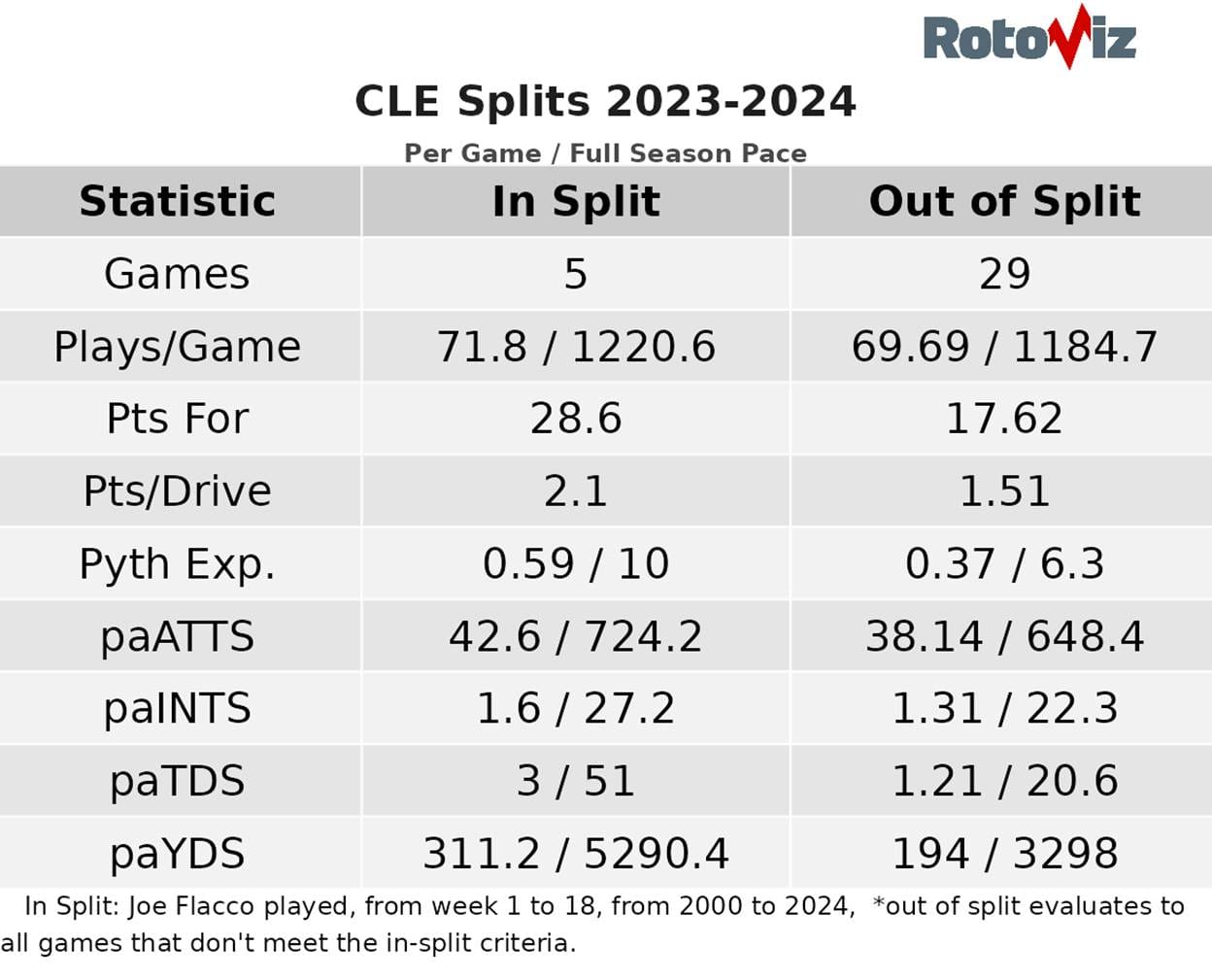
People have been inclined to dismiss Dillon Gabriel and Shedeur Sanders if Flacco were to falter, but that’s not fully grounded. Gabriel flashed in preseason after already earning Day 2 draft capital, while Sanders was once a projected first-rounder before his dramatic slide. Smart analysts like Daniel Jeremiah and Trevor Sikkema were high on him, and in a Shanahan-influenced system that elevates QBs, writing either rookie off entirely seems premature for fantasy purposes.
If the Browns remain competitive on offense, they should have a high play count, as they usually play at a breakneck pace under Stefanski (they ran the most offensive plays in the NFL in 2023). And if that all materializes, Jeudy, Njoku, Ford, Sampson, Tillman, and Fannin could all be fantasy viable.
Side note: Sampson and Fannin (along with Mason Graham and Carson Schwesinger) were held out entirely from preseason Game 2, despite no health issues. Stefanski credited the decision to their high workloads in joint practices with Philadelphia throughout the week, where they drew rave reviews. He even said this:
“Playing in the first game, the practice versus Carolina, the practices in Philly, felt like they got a lot of good work, a lot of plays… were intentional about how many plays they got in Philly, knowing that would be the plan.”
In Preseason Week 3, each drew the start despite the presence and participation of Ford and David Njoku. Each also had significant work with the starters, with Fannin catching a TD from Flacco, and Sampson hauling in a catch, spinning, and roaring along the left numbers for a first down.
Under Stefanski, rookies don’t usually get bubble-wrapped in preseason. The only guys we’ve seen handled with real caution were Jeremiah Owusu-Koramoah, Martin Emerson, and Greg Newsome — all of whom immediately stepped into starting roles and averaged 772 snaps as rookies.
Yes, Sampson and Fannin still appear to sit behind established vets, but these preseason developments feel notable, and they're flying under the radar.
Verdical Luck
Veridical Luck
noun | \ vəˈrɪdɪkəl lʌk \
Definition:
The occurrence of arriving at a truth or correct outcome by chance, where accuracy or correctness is achieved not by skill, reasoning, or design, but purely through fortunate circumstances.
Etymology:
From veridical (Latin veridicus, “speaking the truth,” from verus meaning “true” + dicere meaning “to say”) + luck (Middle English lucke, perhaps from Middle Dutch luc, meaning “happiness, fortune”).
Pronunciation:
· American English: /vəˈrɪdɪkəl lʌk/
Usage Note:
Veridical luck describes situations in which someone stumbles upon the truth or makes a correct discovery without intention, logical process, or skill; their success is due solely to happenstance.

